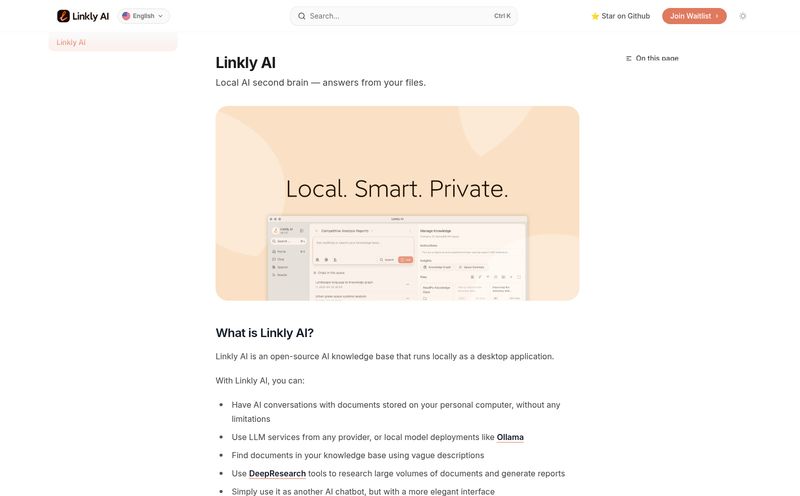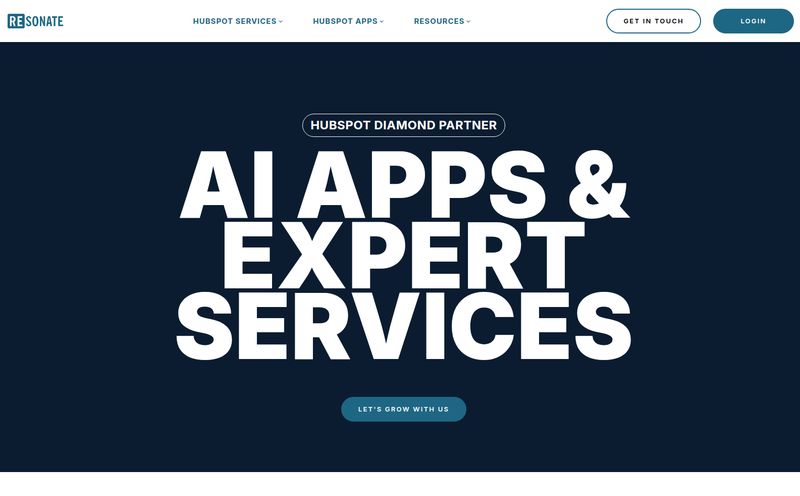If you're in the life sciences space—pharma, biotech, hardcore academic research—you know the struggle. It’s a classic story. Your data is everywhere. Genomic data is in one silo, proteomics in another, clinical trial results are locked in a spreadsheet on someone's laptop, and your lab notes are... well, let's just hope they're digitized. Getting all that information to talk to each other can feel like trying to host a United Nations summit in a room where everyone speaks a different language. It's exhausting.
For years, we've been promised a solution. A single platform to rule them all. So when I stumbled upon Constellab, my professional curiosity was definitely piqued. It bills itself as an open-source AI and data platform specifically for life sciences. Big promises. But as someone who's seen a lot of platforms come and go, I've learned to be a healthy skeptic. So, I did a little digging.
So, What is Constellab, Really?
Think of Constellab as a kind of digital mission control for your research data. At its core, it’s an open-source, modular platform designed to give data scientists and engineers in our field a single, secure place to work their magic. It’s not just another data bucket. The idea is to create a flexible infrastructure that handles everything from the initial data wrangling all the way to deploying sophisticated AI models.
Instead of wrestling with a dozen disparate tools, you get a unified environment. It’s built for collaboration, which is huge. No more emailing sensitive datasets or fighting over which version of a script is the 'final' one. It aims to be the connective tissue between your lab work, your data analysis, and your project delivery. A pretty ambitious goal, if you ask me.
The Features That Actually Matter
A platform is only as good as its tools. I’ve seen some with flashy UIs that are all sizzle and no steak. Constellab seems to focus on the practical stuff, which I appreciate. Let's break down what it brings to the table.
From Data Chaos to a Unified Hub
This is the big one. Constellab helps you connect your various data sources and pull them into one place. It’s not just about dumping files; it’s about consolidation and harmonization. This means it works to make your different datasets speak the same language, which is the foundational step for any meaningful analysis. They also talk about data federation and traceability, which is music to the ears of anyone working in a regulated GxP environment. Knowing where your data came from and what’s been done to it isn't just nice to have; it’s a necessity.
The Fun Stuff: AI, Modeling, and Visuals
Once your data is in order, you get to play. The platform is designed for serious AI, modeling, and visualization. What I particularly like is that it isn’t a restrictive, proprietary black box. I saw logos for tools we all know and love—Jupyter, RStudio, Python, Git. This tells me they understand that data scientists want to use their preferred tools, not be forced into a one-size-fits-all editor. You can build your models, run your analyses, and create compelling visualizations without leaving the ecosystem. That efficiency boost alone is a major selling point.
Collaboration Without the Headaches
Working in a team on sensitive life sciences data is always a balancing act between collaboration and security. Constellab addresses this with dedicated project and team workspaces. It provides a secure sandbox where your team can share code, data, and insights. This is coupled with tools for creating and sharing digital reports. Instead of a static PDF, you can deliver interactive results, which is far more impactful when you're trying to convince stakeholders or share findings with colleagues.
">
The Constellab Advantage: What Sets It Apart?
Okay, so it has good features. But a lot of platforms do. What's the secret sauce here? From my analysis, it boils down to a few key things.
First, it's open-source. I've always had a soft spot for open-source tech. There's a transparency and a community-driven ethos that you just don't get with closed, proprietary systems. You’re not locked into a single vendor’s ecosystem forever. You have the flexibility to inspect the code, customize it, and contribute back.
Second, and this one really caught my attention, is their focus on low-carbon analytics. This is the first time I've seen a life sciences platform actively promote green-computing technology. In an age where every company is (or should be) thinking about its environmental footprint, building data infrastructure that is computationally efficient isn't just smart, it's responsible. It’s a subtle point but shows a very modern, forward-thinking approach.
Let's Be Real: The Potential Hurdles
No tool is perfect. And in the spirit of a genuine review, we have to talk about the potential downsides. I'd be doing you a disservice if I painted a flawless picture.
The first flag for me is that a platform this flexible and powerful may require some real technical expertise to set up and manage effectively. This isn't likely a plug-and-play solution for a biologist with no coding experience. It seems squarely aimed at teams with dedicated data engineers or bioinformaticians who can handle the backend. That’s not necessarily a bad thing, just something to be aware of.
Another point is that the open-source nature means you might be relying on community support for some components. While community support can be amazing, it's not the same as having a dedicated, 24/7 enterprise support line to call when things go sideways at 2 AM. For mission-critical applications, this is a risk to weigh. Finally, there's the pricing...
">
The Pricing Question
Ah, the classic “Contact Us for Pricing” button. As a prospective user, it's one of my pet peeves. While the lack of a public pricing page allows for customized quotes, it also makes it impossible to do a quick cost-benefit analysis. You have to engage with their sales team to understand the investment. Based on the platform’s capabilities, I’d wager it’s an enterprise-level solution with a price tag to match, especially for the supported, hosted versions. The FAQ on their site does mention a free access question, suggesting there might be a free or trial tier, but for any serious implementation, expect to have a conversation about budget.
Frequently Asked Questions About Constellab
I had a few questions myself, and I'm guessing you do too. Here are some quick answers.
Is Constellab completely free to use?
The technology is open-source, which means the code is freely available. However, Constellab as a managed service or an enterprise deployment will almost certainly have associated costs for support, hosting, and premium features. You'll need to contact them for specifics.
Do I need to be a coding expert to use it?
It seems that way. While they aim to make data accessible, the toolset (Jupyter, R, Python) is geared towards data scientists, data engineers, and bioinformaticians who are comfortable with code. It’s a power-user tool, not necessarily a beginner's one.
">
What makes it a “green” or “low-carbon” platform?
This generally refers to using energy-efficient computing infrastructure and optimizing code and data processing to reduce the overall energy consumption. By minimizing computational waste, the platform lowers its carbon footprint, which is a growing concern in large-scale data analysis.
How secure is the data on Constellab?
Security seems to be a cornerstone of their offering. Features like dedicated workspaces, data traceability, and secure access controls are designed for the high-stakes environment of life sciences, where data integrity and confidentiality are non-negotiable.
What kind of teams would benefit most from this platform?
I see this being a fantastic fit for mid-to-large-sized biotech and pharmaceutical companies, as well as well-funded academic research consortia. Any team that is feeling the pain of data silos and has the technical talent to manage a sophisticated data science environment could see a massive benefit.
My Final Take
So, is Constellab the silver bullet for data challenges in life sciences? Maybe. No platform is a magic wand, but this one gets a lot of things right. It understands its audience—the data-savvy scientists and engineers—and gives them the powerful, flexible tools they need in a secure, collaborative environment.
The commitment to open-source principles and the nod to green computing are, for me, major plus points that show a company in tune with the future of tech. While the technical barrier to entry and opaque pricing are things to consider, they don’t detract from the core promise.
If your team is drowning in data and looking for a way to build a more efficient, traceable, and innovative research pipeline, I'd say Constellab is absolutely worth putting on your shortlist. It might just be teh mission control you've been looking for to finally make sense of it all.
Reference and Sources
- Constellab Official Website (Source of images and core information)
- Jupyter Project
- RStudio



